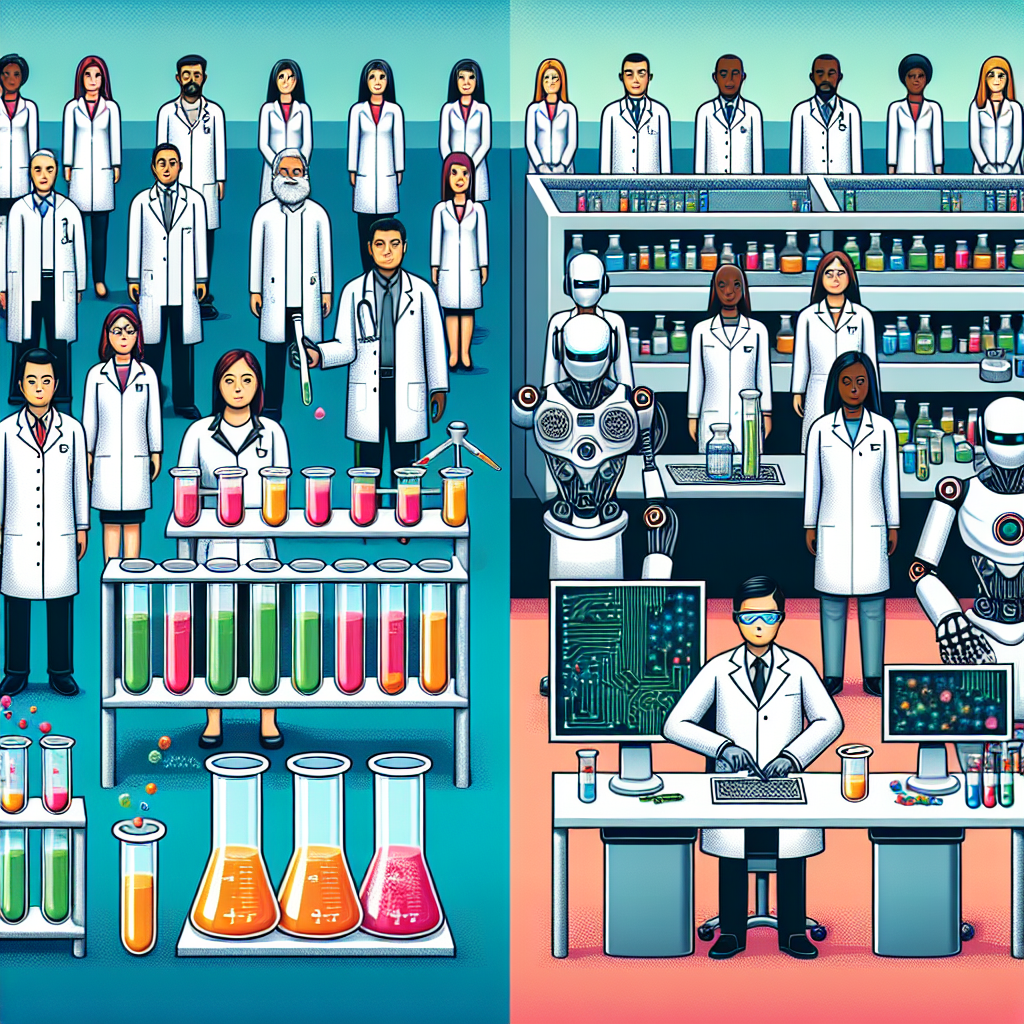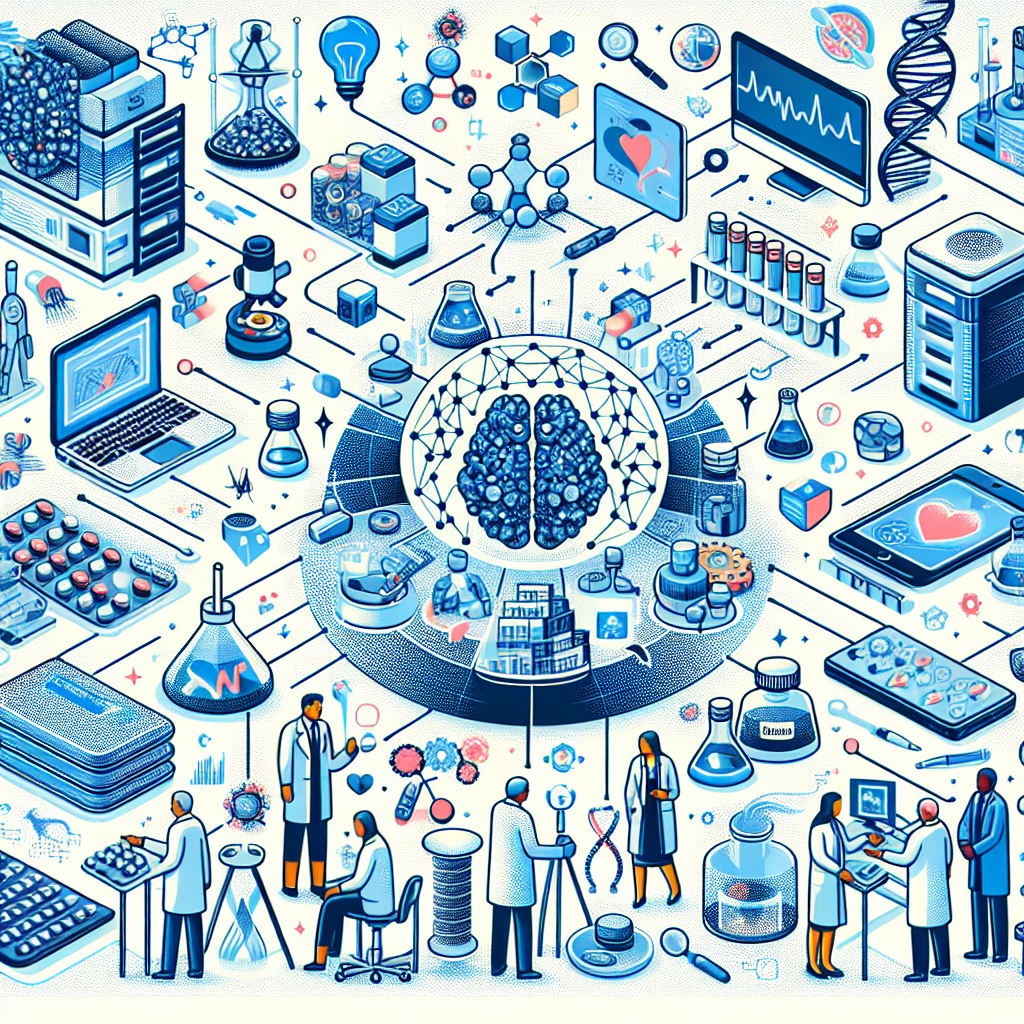How AI is Transforming the Pharma Industry

Discover how AI is revolutionizing the Pharma Industry! Learn about the latest advancements, the impact on drug discovery, personalized medicine, and much more. Don’t miss out on this technological revolution. Click here to explore more.
Exploring the Impact of AI on Drug Discovery in the Pharma Industry
Artificial Intelligence (AI) is revolutionizing various sectors, and the pharmaceutical industry is no exception. The advent of AI in the pharma industry is transforming the way drugs are discovered, developed, and brought to market. This transformation is not only accelerating the drug discovery process but also making it more cost-effective and efficient.
Drug discovery, the process of identifying potential new medicines, is a complex and time-consuming endeavor. It involves a series of intricate steps, from understanding the disease or condition to be treated, identifying a suitable target for intervention, and finally, developing a molecule or compound that can interact with this target to produce the desired therapeutic effect. Traditionally, this process could take up to 15 years and cost billions of dollars. However, AI is poised to change this.
AI, with its ability to analyze vast amounts of data quickly and accurately, is helping to streamline the drug discovery process. Machine learning algorithms, a subset of AI, can sift through millions of chemical structures, identify potential drug candidates, and predict their properties and effects. This not only speeds up the process but also reduces the risk of failure in later stages of drug development.
Moreover, AI can help in the identification of new therapeutic targets. By analyzing genetic data and scientific literature, AI can uncover patterns and connections that humans might miss. This can lead to the discovery of new targets for drug intervention, opening up new avenues for treatment.
AI is also transforming the way clinical trials are conducted. Clinical trials, a crucial part of the drug discovery process, involve testing the safety and efficacy of new drugs in humans. AI can help design these trials more efficiently, predict outcomes, and monitor patient responses in real-time. This can lead to faster, more accurate results, and ultimately, quicker approval of new drugs.
Furthermore, AI can help in personalizing medicine. By analyzing a patient’s genetic makeup, AI can predict how they will respond to a particular drug. This can help in developing personalized treatment plans, thereby improving patient outcomes.
However, the integration of AI in the pharma industry is not without challenges. Issues related to data privacy, regulatory compliance, and the need for skilled personnel to manage and interpret AI outputs are some of the hurdles that need to be overcome. Despite these challenges, the potential benefits of AI in drug discovery are immense.
In conclusion, AI is transforming the pharma industry by making the drug discovery process faster, more efficient, and cost-effective. It is helping in the identification of new therapeutic targets, streamlining clinical trials, and personalizing medicine. While there are challenges to be addressed, the potential of AI in revolutionizing drug discovery is undeniable. As we move forward, we can expect AI to play an increasingly significant role in the pharma industry, bringing new drugs to market more quickly and efficiently, and ultimately improving patient care.
The Role of Artificial Intelligence in Streamlining Clinical Trials

Artificial Intelligence (AI) is revolutionizing various sectors, and the pharmaceutical industry is no exception. One of the most significant areas where AI is making a substantial impact is in streamlining clinical trials. Clinical trials are a critical component of the drug development process, and they are notoriously complex, time-consuming, and expensive. However, with the advent of AI, the landscape of clinical trials is undergoing a significant transformation.
AI is playing a pivotal role in enhancing the efficiency and effectiveness of clinical trials. It is doing so by automating various processes, reducing errors, and speeding up the time it takes to bring a drug to market. One of the ways AI is achieving this is through predictive analytics. AI algorithms can analyze vast amounts of data from previous trials and use this information to predict outcomes of future trials. This not only saves time but also reduces the risk of failure, as potential issues can be identified and addressed before they become problematic.
Moreover, AI is also helping in patient recruitment, a process that has traditionally been a significant bottleneck in clinical trials. Identifying and enrolling suitable participants is a challenging task that often leads to delays. However, AI can streamline this process by analyzing patient data to identify those who meet the trial’s criteria. This not only speeds up the recruitment process but also ensures that the selected participants are the best fit for the trial, thereby increasing its chances of success.
In addition to predictive analytics and patient recruitment, AI is also transforming the way data is collected and analyzed during clinical trials. Traditionally, data collection has been a manual process prone to errors. However, AI can automate this process, ensuring that data is collected accurately and consistently. Furthermore, AI can analyze this data in real-time, providing researchers with immediate insights that can help them make informed decisions.
AI is also playing a crucial role in monitoring patient adherence during clinical trials. Ensuring that participants follow the trial protocol is essential for the validity of the results. However, this has traditionally been a challenging task. AI can help overcome this challenge by using technologies such as wearable devices to monitor patients’ adherence to the trial protocol. This not only ensures the integrity of the trial but also improves patient safety.
Lastly, AI is helping to reduce the cost of clinical trials. The automation of various processes, the reduction of errors, and the speed at which trials can be conducted all contribute to significant cost savings. This is particularly important given the high cost of drug development.
In conclusion, AI is transforming the pharmaceutical industry by streamlining clinical trials. It is enhancing efficiency, reducing errors, speeding up the process, and reducing costs. As AI continues to evolve, its impact on clinical trials and the pharmaceutical industry as a whole is likely to increase. This not only bodes well for the industry but also for patients, as it means that potentially life-saving drugs can be brought to market more quickly and cost-effectively.
How AI is Revolutionizing Patient Care in the Pharma Industry
Artificial Intelligence (AI) is rapidly transforming various sectors, and the pharmaceutical industry is no exception. The advent of AI has brought about a revolution in patient care, significantly enhancing the efficiency and effectiveness of treatments. This article will delve into how AI is revolutionizing patient care in the pharma industry.
AI’s impact on patient care is profound, starting from diagnosis to treatment and follow-up. Traditionally, diagnosing diseases has been a time-consuming process, often involving multiple tests and consultations. However, AI has the potential to streamline this process. Machine learning algorithms can analyze vast amounts of data from medical records, genetic information, and even lifestyle habits to predict the likelihood of diseases. This predictive analysis can lead to early detection of diseases, allowing for timely intervention and improved patient outcomes.
Moreover, AI is also transforming the way treatments are administered. Personalized medicine, a concept that tailors treatment plans to individual patients based on their genetic makeup and lifestyle, is becoming a reality thanks to AI. Machine learning algorithms can analyze a patient’s genetic information and predict how they will respond to different medications. This allows doctors to prescribe the most effective treatment plan, reducing trial-and-error and minimizing side effects.
AI is also playing a crucial role in drug discovery and development, a process that traditionally takes years and billions of dollars. AI can analyze vast amounts of data to identify potential drug candidates, predict their effectiveness, and even anticipate potential side effects. This not only speeds up the drug discovery process but also makes it more cost-effective. Furthermore, AI can help in clinical trials by identifying suitable candidates, monitoring their progress, and analyzing the results. This can significantly reduce the time and cost of bringing a new drug to market.
In addition to diagnosis and treatment, AI is also enhancing patient care by improving adherence to medication. Non-adherence to medication is a significant problem in healthcare, leading to poor health outcomes and increased healthcare costs. AI can help tackle this issue by sending reminders to patients to take their medication, monitoring their adherence, and even predicting which patients are likely to be non-adherent. This can lead to improved health outcomes and reduced healthcare costs.
AI is also revolutionizing patient care by improving the management of chronic diseases. Chronic diseases require ongoing management, which can be challenging for patients and healthcare providers. AI can help by monitoring patients’ symptoms, predicting flare-ups, and providing personalized advice on managing the disease. This can significantly improve the quality of life for patients with chronic diseases.
In conclusion, AI is revolutionizing patient care in the pharma industry in numerous ways. From early diagnosis and personalized treatment to improved medication adherence and chronic disease management, AI is enhancing the efficiency and effectiveness of patient care. As AI continues to evolve, we can expect even more significant transformations in the pharma industry. However, it is crucial to ensure that these advancements are implemented responsibly, with due consideration for patient privacy and ethical considerations. With the right approach, AI has the potential to significantly improve patient care in the pharma industry, leading to better health outcomes and improved quality of life.